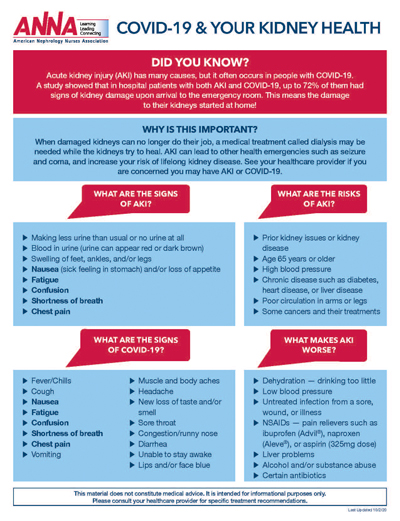Community-Focused Educational Resource: COVID-19 and Your Kidney Health
This educational flyer is designed to help community members reduce the risk of developing acute kidney injury (AKI). The flyer focuses on the connection between AKI and COVID-19 and includes signs and symptoms to help promote prevention, identification, and early treatment. Nephrology nurses are encouraged to distribute the flyer to other healthcare professionals and your communities to help educate them on the connection between COVID-19 and AKI.
Download Flyer ~ COVID-19 & Your Kidney Health
Download Flyer ~ COVID-19 & Your Kidney Health [Spanish]
Letters of Introduction
Use the following letters to introduce the flyer to healthcare professionals and community leaders. Encourage them to share this resource with their patients and communities.
Download letter to healthcare professionals
Download letter to community leaders
Background/Additional Information
In late 2019, the World Health Organization (WHO) described the first cases associated with the newly discovered virus called severe acute respiratory coronavirus 2 (SARS-CoV-2) (WHO, 2020). SARS-CoV-2 is most commonly referred to as COVID-19. Because of media coverage, most people are aware that COVID-19 damages the lungs and patients often require the use of a ventilator (Centers for Disease Control and Prevention, 2020). However, they may not be aware COVID-19 also can affect other body organs, including the kidneys.
Acute kidney injury (AKI) is a condition where the kidneys suddenly lose their ability to work properly and may present with a decrease in urine production. This sudden loss of kidney function, or AKI, can develop over days or even hours and can become so severe that a medical procedure called dialysis may be required to help the person recover.
AKI can occur for many reasons, but there is growing concern that having COVID-19 may increase the risk for developing AKI (Pelayo et al., 2020). The damage may begin before a person is even aware of it or feels the need to seek medical attention. For example, one study in an inner-city hospital system in an underserved area found that almost half (49.3%) of those with COVID-19 also had AKI. The majority of these individuals were found to have AKI indicators (72%) at the time of hospital admission (Pelayo et al., 2020). While a lot is still unknown regarding COVID-19, certain factors and conditions seem to increase the risk for developing AKI, including gender (male), diabetes mellitus, high blood pressure, age (60 years or older), heart disease, and kidney disease (Fu et al., 2020; Hirsch et al., 2020: Pelayo et al., 2020). Also, AKI in conjunction with COVID-19 has been associated with an increased risk of death, especially in individuals requiring dialysis (Fu et al., 2020, Trabulus et al. 2020).
AKI prevention and early detection can have a positive impact on kidney health and outcomes for community members, especially high-risk individuals who experience health disparities and live in underserved areas. For this reason, ANNA developed this educational flyer designed to help community members reduce the risk of developing AKI. The flyer focuses on the connection between AKI and COVID-19 and includes signs and symptoms to help promote prevention, identification, and early treatment.
Nephrology nurses are encouraged to distribute the flyer to their communities.
References
Centers for Disease Control and Prevention. (2020, August 25). Information for healthcare professionals about coronavirus (COVID-19). https://www.cdc.gov/coronavirus/2019-ncov/hcp/index.html
Fu, E.L., Janse, R.J., de Jong, Y., van der Endt, V., Milders, J., van der Willik, E.M., de Rooij, E., Dekkers, O.M., Rotmans, J.I., & van Diepen, M. (2020). Acute kidney injury and kidney replacement therapy in COVID-19: A systematic review and meta-analysis. Clinical Kidney Journal, 13(4), 550–563. https://doi.org/10.1093/ckj/sfaa160
Hirsch, J.S., Ng, J. H., Ross, D.W., Sharma, P., Shah, H.H., Barnett, R.L., Hazzan, A.D., Fishbane, S., Jhaveri, K.D., Northwell COVID-19 Research Consortium, & Northwell Nephrology COVID-19 Research Consortium. (2020). Acute kidney injury in patients hospitalized with COVID-19. Kidney International, 98(1), 209-218. https://doi.org/10.1016/j.kint.2020.05.006
Pelayo, J., Lo, K.B., Bhargav, R., Gul, F., Peterson, E., DeJoy III, R., Salacup, G. F., Albano, J., Gopalakrishnan, A., Azmaiparashvili, Z., Patarroyo-Aponte, G., & Rangaswami, J. (2020). Clinical characteristics and outcomes of community- and hospital-acquired acute kidney injury with COVID-19 in a US inner city hospital system. Cardiorenal Medicine, 10(4), 223-231. https://doi.org/10.1159/000509182
Trabulus, S., Karaca, C., Balkan, I.I., Dincer, M.T., Murt, A., Ozcan, S.G. Karaali, R., Mete, B., Baker, A., Kuskucu, M.A., Altiparmak, M.R., Tabak, F., Seyahi, N. (2020, September 3.) Kidney function on admission predicts in-hospital mortality in COVID-19. PLOS One. https://doi.org/10.1371/journal.pone.0238680
Yang, X., Jin, Y., Li, R., Zhang, Z., Sun, R., & Chen, D. (2020). Prevalence and impact of acute renal impairment on COVID-19: A systematic review and meta-analysis. Critical Care, 24, 356. https://doi.org/10.1186/s13054-020-03065-4

